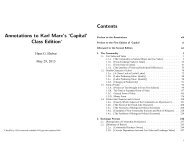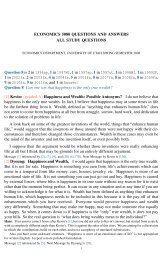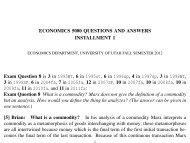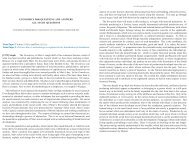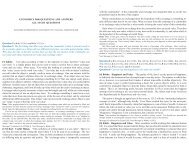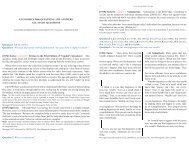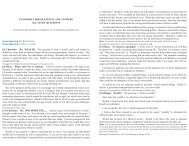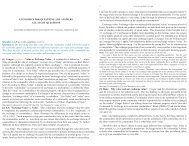Question 1 What did Marx mean with his formu - University of Utah
Question 1 What did Marx mean with his formu - University of Utah
Question 1 What did Marx mean with his formu - University of Utah
You also want an ePaper? Increase the reach of your titles
YUMPU automatically turns print PDFs into web optimized ePapers that Google loves.
U <strong>of</strong> <strong>Utah</strong> Econ 5080 2007fa 39<br />
<strong>Marx</strong>’s goal is not a wage high enough so that pr<strong>of</strong>its are eliminated, but <strong>his</strong> goal is the abolition <strong>of</strong> wage-labor.<br />
Laborers should collectively be their own bosses rather than working for the capitalist, and production should be<br />
for use-value rather than for exchange-value.<br />
Message [42] referenced by [44].<br />
[44] Hans: Class Relations and Commodity Trade. In [29], I briefly summarized<br />
<strong>Marx</strong>’s theory <strong>of</strong> pr<strong>of</strong>its: pr<strong>of</strong>its are the residual because workers produce more value than<br />
they get paid. Much more needs to be said here, but in a nutshell that’s the story.<br />
Scott [39] and Yossarian [42], conclude from t<strong>his</strong> that the labor <strong>of</strong> the workers cannot be<br />
sold at its value. Scott brings very good prima facie evidence that the worker does not get<br />
the full value he or she produces:<br />
It is clear to see by the wealth that is gradually acquired by the owners over<br />
time while the status <strong>of</strong> the workers, who initially produced the goods that<br />
they became wealthy from, are in the same position as before or they are in<br />
a worse position.<br />
Over the years, the capitalist gets richer and richer, while the workers stays at the same<br />
level. That is good evidence that the worker’s labor enriches the capitalist and not the worker.<br />
Yossarian argues that t<strong>his</strong> contradicts the laws <strong>of</strong> commodity trade. According to these laws,<br />
Yossarian says,<br />
the value added to a specific commodity through labor would go directly<br />
back to those who added the value in the first place.<br />
How would t<strong>his</strong> play itself out in the competitive interactions between workers and capitalists?<br />
If a worker does not get the full value <strong>of</strong> <strong>his</strong> labor from the capitalist, he will quit and<br />
sell <strong>his</strong> own products, in t<strong>his</strong> way he can be assured that he does get the full equivalent <strong>of</strong><br />
<strong>his</strong> labor. But there is a hitch: the worker cannot sell <strong>his</strong> own products, because he does not<br />
have access to the modern <strong>mean</strong>s <strong>of</strong> production which would allow him to stay competitive.<br />
Here you see how the separation from the <strong>mean</strong>s <strong>of</strong> production prevents the worker from<br />
getting the full equivalent for <strong>his</strong> labor. Our separation from the <strong>mean</strong>s <strong>of</strong> production is a<br />
very basic fact <strong>of</strong> capitalist society. It is so fundamental that we are usually not even aware<br />
<strong>of</strong> it. It is a very artificial situation that all the wealth <strong>of</strong> t<strong>his</strong> society is owned by a small<br />
elite, and the great majority <strong>of</strong> people just have enough money to get by. No wonder Scott<br />
calls the capitalists the “owners <strong>of</strong> the society.”<br />
Next Message by Hans is [45].<br />
<strong>Question</strong> 80 is 44 in 1997ut, 69 in 2004fa, 80 in 2007SP, 81 in 2008fa, and 99 in 2012fa:<br />
<strong>Question</strong> 80 <strong>Marx</strong> says that as use-values commodities do not contain an atom <strong>of</strong> value.<br />
Would he also say that the labor process does not contain an atom <strong>of</strong> abstract labor?<br />
[48] Teight: It would be inaccurate to say that <strong>Marx</strong> believes that abstract labor isn’t<br />
included in the labor process. Any labor process requires some sort <strong>of</strong> abstract labor. Labor<br />
power consists <strong>of</strong> what a laborer uses to process a given commodity. For example, the<br />
muscles a person uses, or the smarts it takes to produce a given commodity. The labor<br />
power used by a laborer can be used in any labor process regardless <strong>of</strong> the commodity.<br />
40 2007fa Econ 5080 U <strong>of</strong> <strong>Utah</strong><br />
Furthermore, the labor process is the cost <strong>of</strong> a certain labor power. Labor process by a person<br />
is the labor power performed by that person which could have produced several million other<br />
labor processes.<br />
Hans: <strong>What</strong> you say is correct, but you should work on your <strong>formu</strong>lations. Your last sentence, for instance, could<br />
be re<strong>formu</strong>lated as follows (if I understand it right): “Every labor process is performed by a person whose laborpower<br />
could have performed several million other labor processes.”<br />
Next Message by Teight is [127].<br />
<strong>Question</strong> 82 is 84 in 2008SP and 83 in 2008fa:<br />
<strong>Question</strong> 82 Is <strong>Marx</strong>’s concept <strong>of</strong> “value material” attached to commodities, but separate<br />
from their physical material, a metaphor? Is it a phantasy, an invention, which <strong>Marx</strong> needs<br />
to hold <strong>his</strong> labor theory <strong>of</strong> value together? Is <strong>Marx</strong> going overboard here? Or does it really<br />
exist?<br />
[54] Ozz: graded A <strong>Marx</strong> concept <strong>of</strong> “value material” is a metaphor. The value that is<br />
added to a commodity is perfectly represented by the idea <strong>of</strong> presenting it as a metaphor.<br />
The addition <strong>of</strong> value to a certain commodity from labor is real although it is not physical.<br />
A similar metaphor would be saying the service a person gave you was a blanket <strong>of</strong> comfort.<br />
The service could have been only that <strong>of</strong> a talk and not actually physical but the metaphor<br />
helps one understand the value <strong>of</strong> that service.<br />
Now if t<strong>his</strong> is a fantasy, or if he is going overboard, I would have to say no. The line<br />
that he describes materiality that I enjoyed was “The materiality <strong>of</strong> human labor that is itself<br />
abstract, lacking further quality and content, is, <strong>of</strong> necessity, an abstract materiality, a thing<br />
made <strong>of</strong> thought.” While in Mexico I remember seeing there little souvenirs and when they<br />
told me that they made them from hand, even if that was a lie or not, added an amount<br />
<strong>of</strong> value to that certain product, even though I knew I could get the same thing made by<br />
machine. T<strong>his</strong> value I feel is what <strong>Marx</strong> was trying to explain when he talked <strong>of</strong> the value<br />
“made <strong>of</strong> thought.”<br />
Hans: I like your first paragraph. T<strong>his</strong> is probably how most <strong>Marx</strong>ists view the issue, although I personally have a<br />
different view, see my [58]. I don’t like your second paragraph as much. My critique <strong>formu</strong>lated in [55] applies to<br />
it, since the labor in the commodity enters your utility function, rather than having its own effects.<br />
Message [54] referenced by [58], [163], and [2008SP:27]. Next Message by Ozz is [93].<br />
[58] Hans: Are <strong>Marx</strong>’s Metaphors Really Metaphors? Ozz is not alone when he says<br />
in [54] that the value material is a metaphor. His “blanket <strong>of</strong> comfort” is an excellent example<br />
how a social interaction can metaphorically be equated to a thing. Most conventional<br />
readings <strong>of</strong> <strong>Marx</strong> have a similar interpretation; they take much <strong>of</strong> what <strong>Marx</strong> says in these<br />
early pages to be metaphorical.<br />
<strong>Question</strong> 82 is a challenge to t<strong>his</strong> conventional interpretation <strong>of</strong> <strong>Marx</strong>. I think that <strong>Marx</strong><br />
takes those issues much too seriously, and he treats them much too consistently, for them to<br />
only be a metaphor. My Annotations try to take the concept <strong>of</strong> a social substance seriously.<br />
We are entering here the area <strong>of</strong> philosophy <strong>of</strong> social sciences which asks “what is a<br />
society?” Margaret Thatcher famously remarked that “society does not exist,” <strong>mean</strong>ing that<br />
the word “society” allows us to talk about all the individuals in society in an abbreviated<br />
fashion, but there is nothing other than these individuals which t<strong>his</strong> word refers to. T<strong>his</strong> is<br />
the methodological individualist point <strong>of</strong> view.



